Discover the best AI voice clone tools for high-quality audio. Our 2025 guide reviews top solutions for publishers, creators, and enterprise.
In This Article
Subscribe to our newsletter
The demand for authentic, scalable audio content has never been higher. From transforming articles into engaging podcasts to creating dynamic video narration and personalized ad reads, the ability to generate high-quality voiceovers is a game-changer for media companies, content creators, and marketing teams alike. The challenge, however, is navigating the crowded market of AI voice cloning technology, which offers everything from instant, browser-based tools to enterprise-grade platforms with deep customization. This guide is designed to cut through the noise and provide a clear, actionable roadmap.
We will deliver an in-depth analysis of the 12 best AI voice clone solutions available today, including industry leaders like ElevenLabs, Descript, and Resemble AI. Our exploration of AI voice cloning highlights a key application of generative AI, a powerful technology that also offers diverse generative AI solutions for growing your content library beyond just audio.
In this resource, we move beyond simple feature lists. We evaluate each platform on the critical factors that matter most to professional teams: the realism of the cloned voice, ease of use, speed, available integrations, and pricing structures. For each tool, you will find direct links and screenshots to give you a clear view of the user experience. Whether you're a podcaster looking to correct errors seamlessly, a publisher aiming to scale video production, or a developer integrating unique voice capabilities into an application, this comprehensive breakdown will help you find the perfect tool to match your voice and your vision.
1. ElevenLabs
ElevenLabs has rapidly become a benchmark in the AI voice space, offering a robust platform that excels in both ease of use and the sheer quality of its output. It's widely recognized as one of the best AI voice clone solutions due to its sophisticated deep learning models that capture nuanced intonation and emotional delivery with startling accuracy. The platform is designed for a broad audience, from individual creators to large enterprise teams, providing tools for everything from audiobook narration to real-time, scalable voice applications.
Its standout feature is the distinction between two cloning methods. Instant Voice Cloning requires just a minute of audio to create a usable voice, perfect for quick projects. For unparalleled realism, Professional Voice Cloning (PVC) uses a larger dataset (at least 30 minutes of clean audio) to create a flawless, studio-grade replica of the source voice.
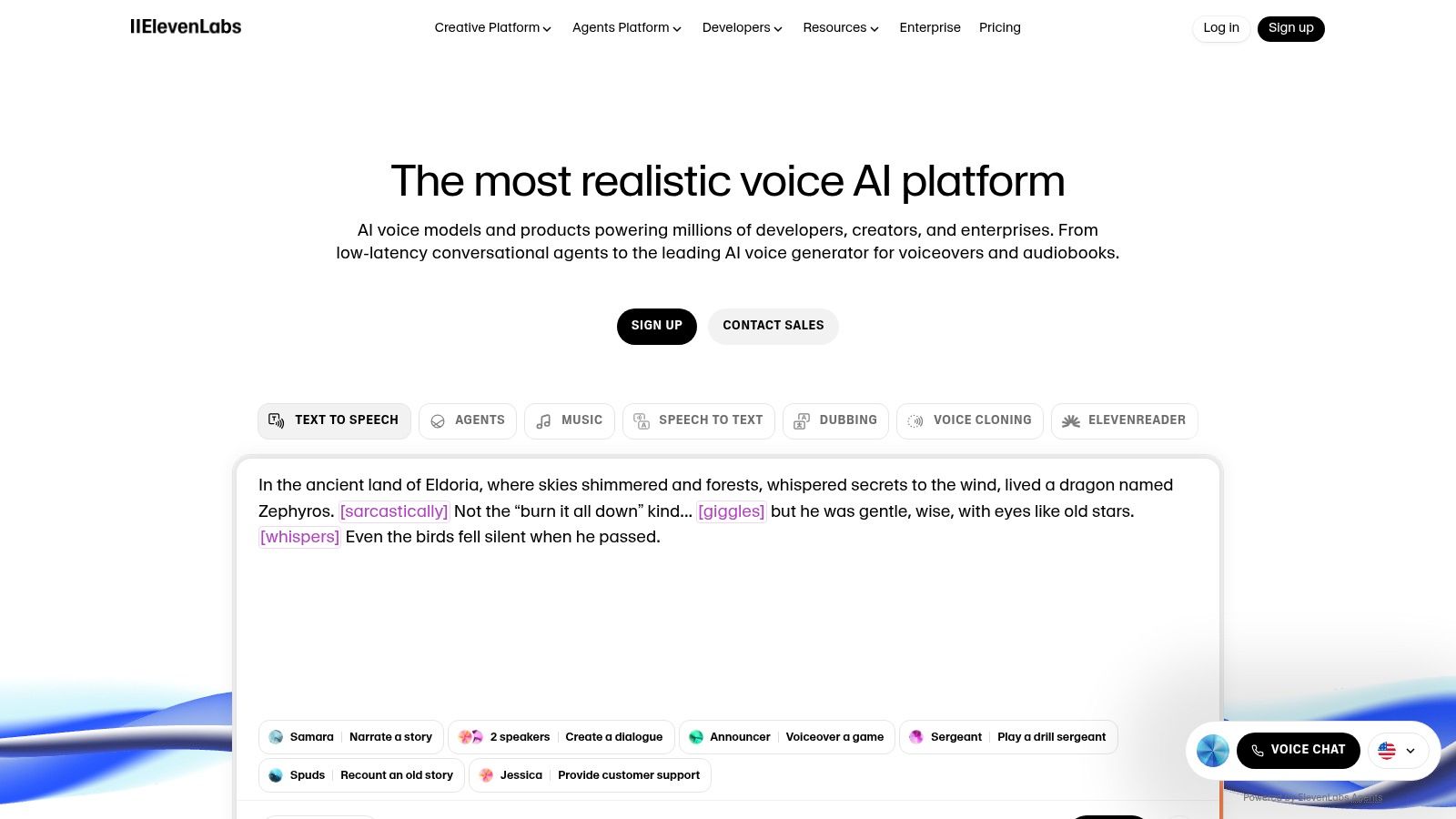
Key Features & User Experience
The user interface, known as the "Studio," is clean and intuitive, making it simple to generate speech, tweak settings, and manage your cloned voices. Beyond cloning, the platform offers a rich library of pre-made synthetic voices and powerful tools for automated dubbing across 29 languages.
- Pricing: A free tier is available to get started, with paid plans starting at just $5/month (currently discounted to $1 for the first month). Pricing is credit-based, which requires users to estimate their usage.
- Best For: Content creators, podcasters, game developers, and businesses needing high-quality, scalable voice generation and dubbing.
- Pros: Exceptional voice quality and emotional range, a well-documented API for developers, and a very active product development cycle.
- Cons: The credit-based system can be confusing to translate into minutes of audio. Some users have also noted a manual verification process when upgrading to PVC, which can introduce a slight delay.
Website: https://elevenlabs.io/
2. Resemble AI
Resemble AI positions itself as a comprehensive, full-stack voice generation platform, making it a strong contender for the best AI voice clone solution for professional and enterprise use. It offers a powerful suite of tools that go beyond simple text-to-speech, providing granular control over voice performance and robust features for secure, large-scale deployment. The platform is designed for users who need not just a voice clone, but an entire ecosystem for managing, deploying, and even protecting their synthetic media assets.
Similar to other top-tier platforms, Resemble AI provides two main cloning options. Rapid Voice Cloning allows users to create a functional voice clone with as little as 10-15 seconds of audio, ideal for rapid prototyping. For high-fidelity results, its Professional Cloning service uses a larger dataset to capture a voice with remarkable detail and emotional range, suitable for commercial productions.
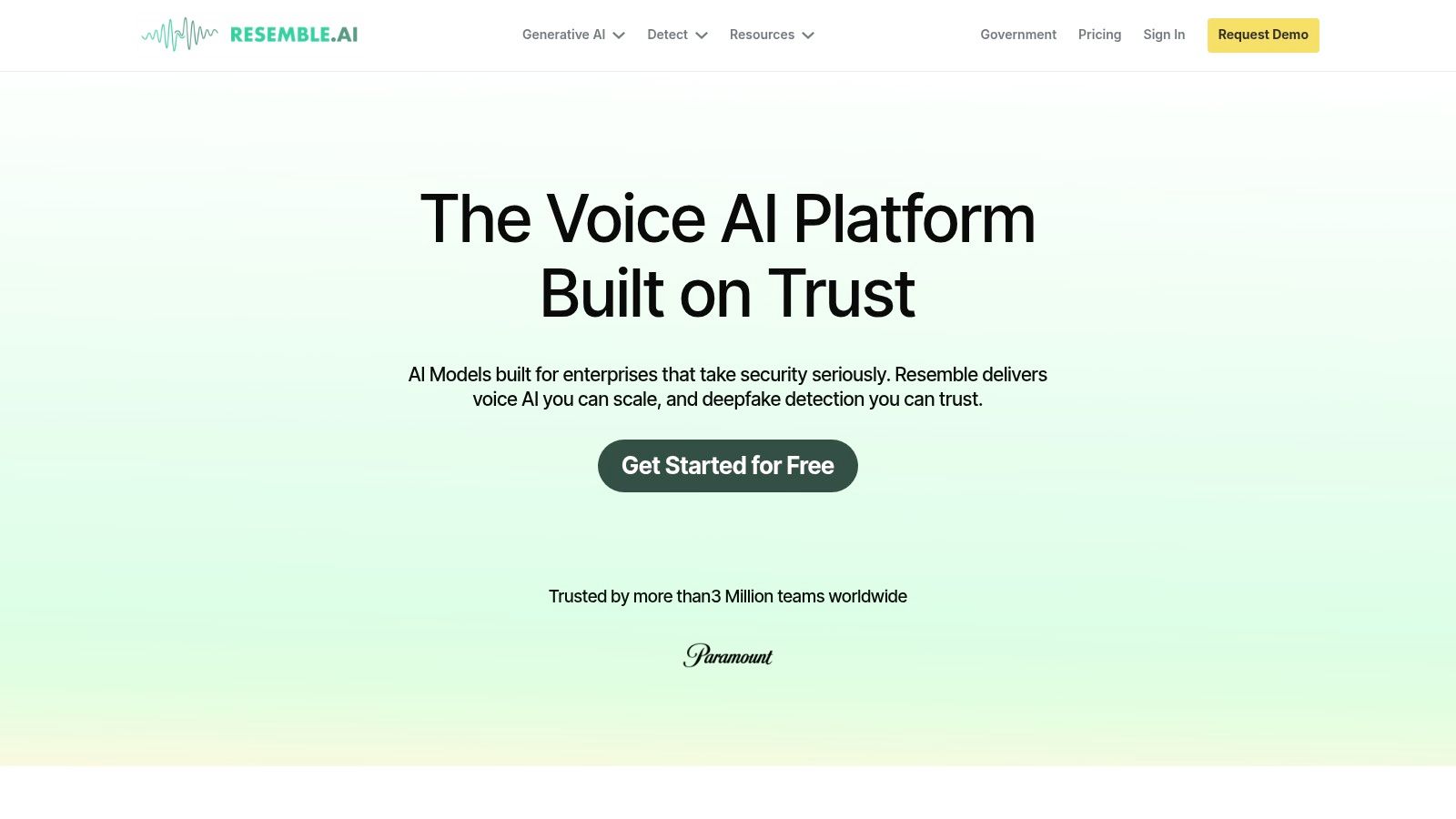
Key Features & User Experience
Resemble AI’s interface provides deep control over voice outputs, allowing users to inject multiple emotions and fine-tune pacing and inflection with SSML-like tags. A standout feature is its marketplace of pre-licensed professional AI voices, which allows teams to access high-quality talent without the custom cloning process. The platform also emphasizes security with its deepfake detection and protection tools, a key consideration for enterprise clients.
- Pricing: Offers a "Pay as you go" option alongside subscription-based Tiers. The Basic tier is $0.006 per second of audio generation, with custom pricing for Pro and Enterprise plans that unlock advanced features.
- Best For: Enterprise teams, media companies, and developers who require API access, real-time generation, extensive language support, and built-in security features.
- Pros: Excellent control over voice emotion and nuance, clear enterprise-grade features including deepfake detection, and a unique marketplace for licensable voices.
- Cons: Access to professional-grade cloning and high-concurrency API usage is reserved for mid-to-upper-tier plans, which can be a significant investment.
Website: https://www.resemble.ai/
3. Voice.ai
Voice.ai carves out a unique niche by focusing heavily on real-time voice modification and cloning, making it a go-to platform for interactive applications like live streaming, gaming, and dynamic voice agents. While it also offers text-to-speech capabilities, its core strength lies in its low-latency performance, allowing users to transform their voice live during a conversation or broadcast. This real-time functionality sets it apart from many competitors that are primarily focused on offline audio generation.
The platform's standout feature is its ability to perform real-time cloning from very short audio samples, often requiring as little as 10-15 seconds of clean audio. This makes it incredibly accessible for users who want to quickly experiment with different voices or create a clone for immediate use in interactive scenarios without needing a large, pre-prepared dataset.
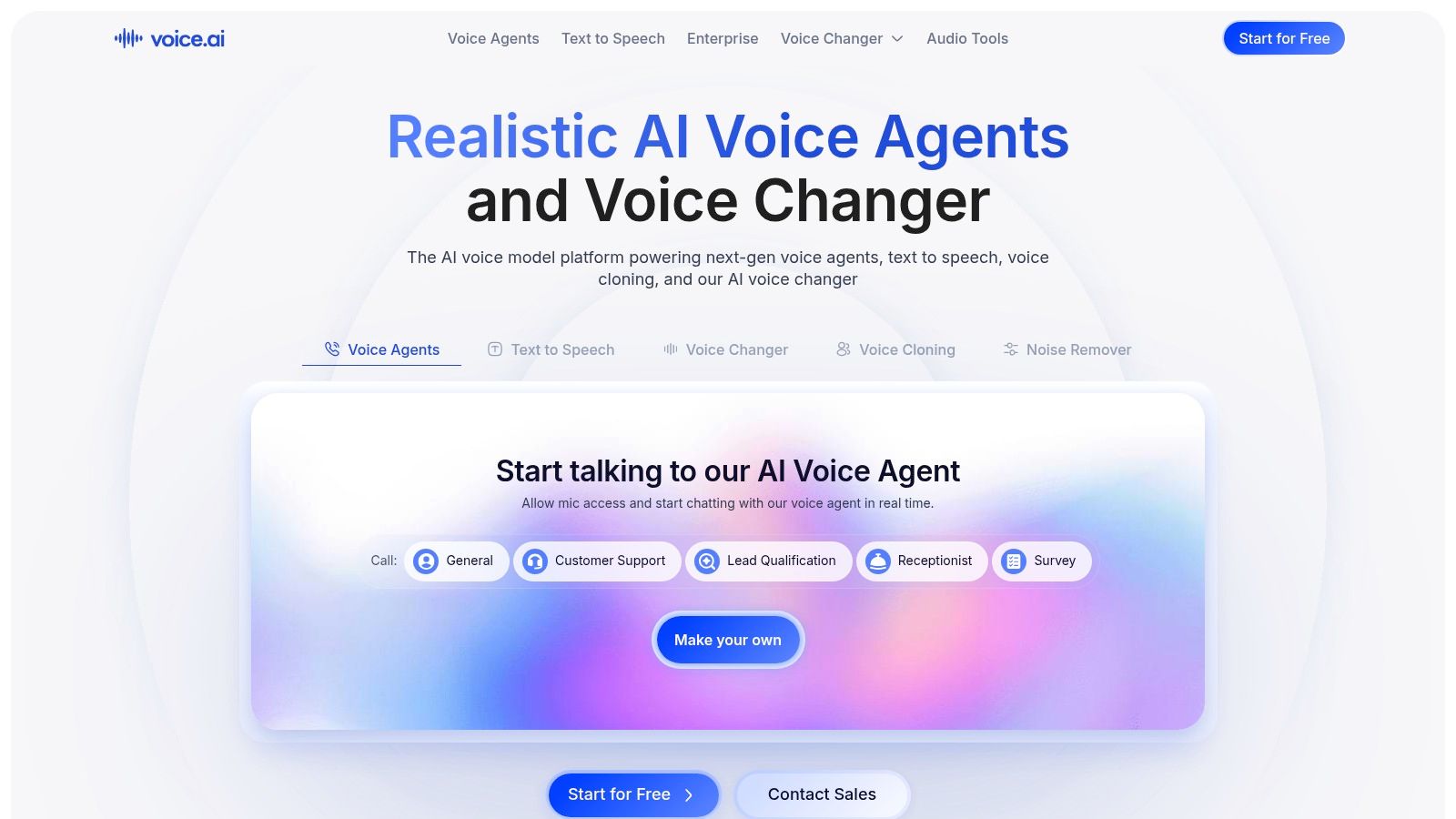
Key Features & User Experience
Voice.ai provides a downloadable desktop application as well as developer-focused SDKs for Python and TypeScript, offering flexibility for both casual users and enterprise-level integrations. The platform is engineered for scenarios where instant feedback is critical, such as powering AI-driven customer service agents or allowing streamers to adopt different personas on the fly. This focus on live performance makes it an excellent choice for creating a highly engaging and interactive user experience.
- Pricing: Offers free options to get started, but detailed pricing tiers and enterprise plans require direct contact with their sales team for a custom quote.
- Best For: Live streamers, gamers, developers building real-time voice applications, and companies creating interactive AI agents.
- Pros: Excellent for real-time and low-latency use cases, very quick cloning process with minimal audio data required, and a strong developer toolkit with APIs/SDKs.
- Cons: Pricing and enterprise service-level agreements (SLAs) are not transparently listed on the website, which can be a hurdle for teams evaluating the tool.
Website: https://voice.ai/
4. Uberduck
Uberduck carves out a unique niche in the AI voice cloning market by focusing on creators, developers, and creative applications like AI-generated raps. It positions itself as an accessible and often playful platform, making it a fantastic starting point for those looking to experiment with voice synthesis without a steep learning curve or high initial investment. The platform offers a straightforward text-to-speech interface alongside its cloning capabilities, prioritizing speed and ease of use for quick content production.
Its main appeal lies in its creator-friendly approach. While it may not offer the same level of granular emotional control as some enterprise-grade competitors, it provides robust API access and clear commercial licensing on its paid tiers. This makes it a practical choice for developers prototyping voice applications or content creators on a budget who need a reliable tool for their projects.
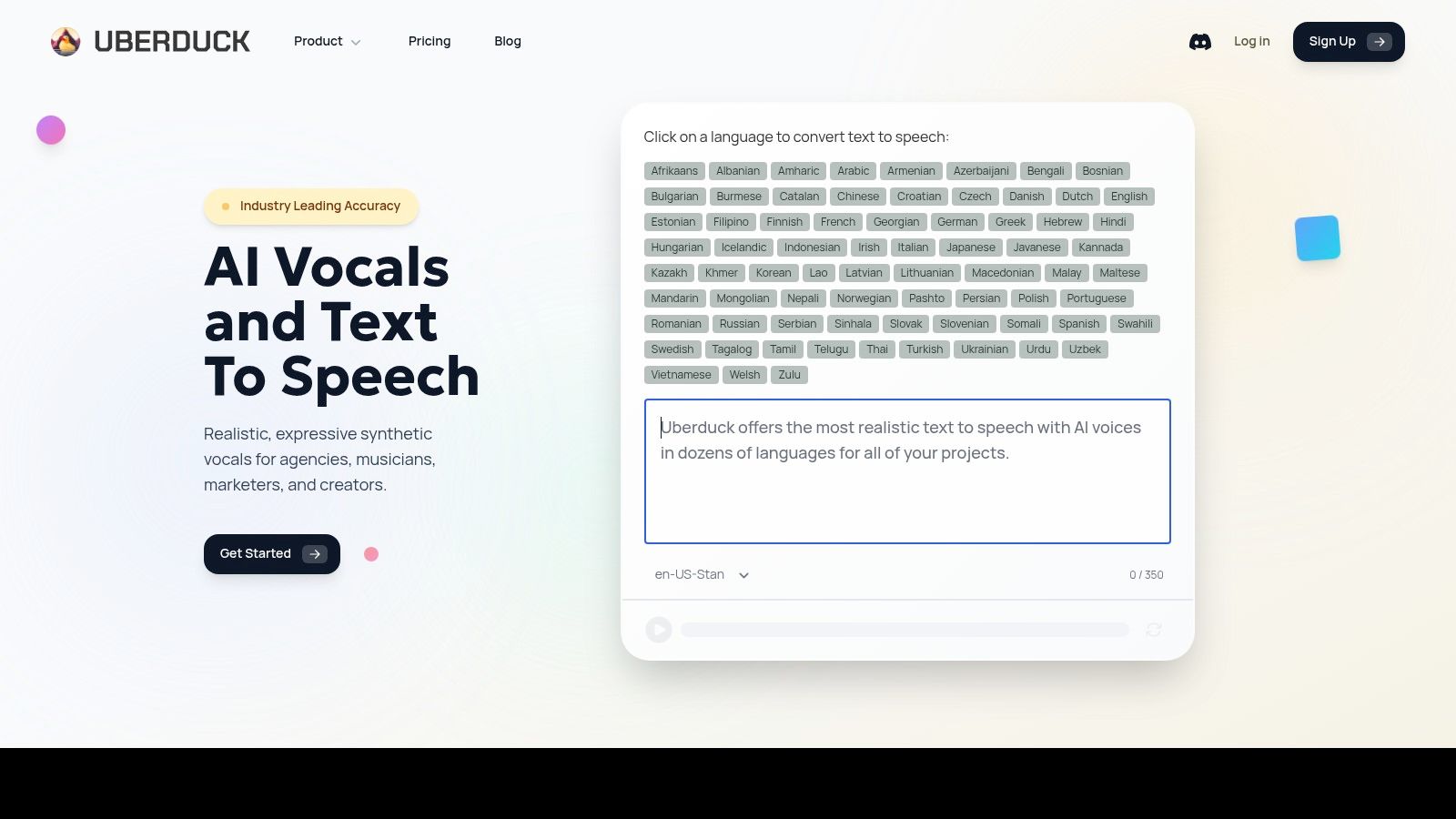
Key Features & User Experience
The user interface is web-based, approachable, and mobile-friendly, allowing users to generate audio quickly. The process for creating an AI voice clone is streamlined for simplicity, catering to users who want fast results. The platform also features a wide library of public voices, including many recognizable character and celebrity types for parody or creative projects, which sets it apart from more corporate-focused tools.
- Pricing: Uberduck provides a free tier for personal use, with paid plans for creators and developers starting at competitive price points (e.g., $9.99/month), granting commercial licenses and API access.
- Best For: Social media content creators, developers needing a quick prototyping tool, and users interested in creative or meme-based audio generation.
- Pros: Very low entry price for commercial use, an approachable and mobile-friendly UI, and unique creative features like AI rap generation.
- Cons: Achieving studio-grade fidelity may require enterprise-level plans, and the platform lacks some of the advanced fine-tuning features found in other top-tier solutions.
Website: https://www.uberduck.ai/
5. Kits.AI
Kits.AI carves out a unique niche in the voice cloning landscape by focusing almost exclusively on musicians, producers, and vocalists. While it offers robust text-to-speech capabilities, its core strength lies in its specialized tools for creating and manipulating singing voices. This makes it an invaluable resource for artists looking to experiment with vocal textures, create AI backing vocals, or even produce entire songs using a cloned voice model.
The platform offers a powerful workflow tailored for music production. Users can upload their own acapellas and apply a cloned AI voice model, effectively replacing the original singer. Its standout features include a Voice Blender, which allows for the creation of unique hybrid voices, and tools for multitrack vocal arrangements. For creators seeking the best AI voice clone for musical applications, Kits.AI provides an unparalleled and specialized toolset.
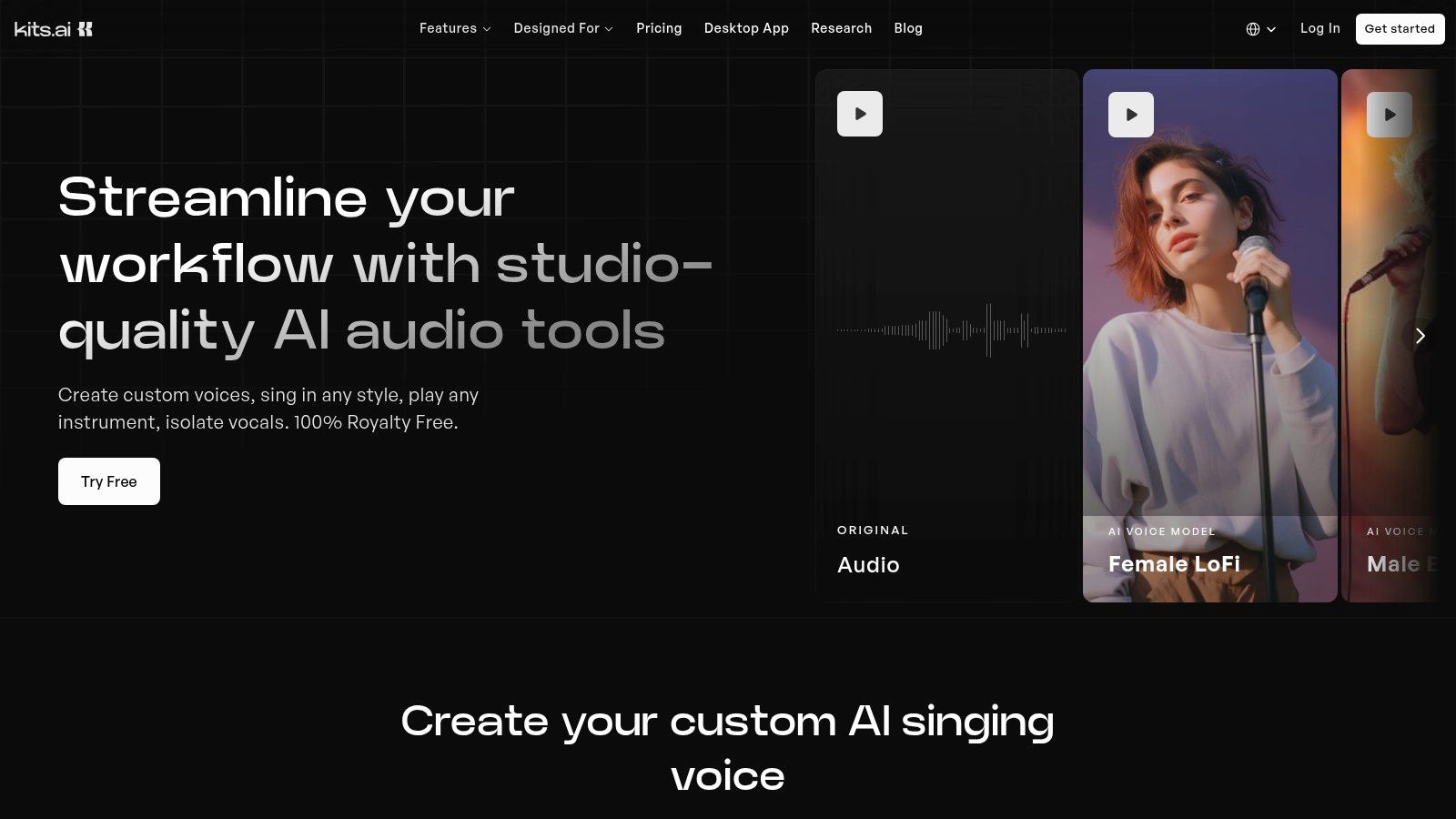
Key Features & User Experience
The interface is designed with a creator-centric workflow in mind, resembling a digital audio workstation (DAW) more than a simple text-to-speech generator. This makes it intuitive for its target audience of musicians. You can easily manage voice models, process audio files, and experiment with different vocal styles directly within the platform.
- Pricing: A free plan is available to test the platform's core features. Paid plans offer more training time, higher-quality models, and increased export minutes, with pricing structured to accommodate different levels of creator needs.
- Best For: Musicians, music producers, and vocalists who need high-fidelity vocal cloning specifically for singing and music creation.
- Pros: Highly specialized for music and singing workflows, offers unique tools like the Voice Blender, and a free tier provides a good entry point.
- Cons: Export minutes are metered even on plans that describe conversions as "unlimited." The platform is less suited for general-purpose narration or corporate use cases compared to others on this list.
Website: https://www.kits.ai/
6. Descript (Overdub)
Descript offers a unique and powerful approach by integrating AI voice cloning directly into a full-featured audio and video editor. Its standout tool, Overdub, isn't just a standalone text-to-speech engine; it's a core part of a creative workflow designed to fix mistakes, add narration, and edit recordings as easily as editing a text document. This makes it an exceptional AI voice clone solution for podcasters, YouTubers, and anyone producing spoken-word content.
The platform's primary strength is its tight integration. Instead of generating audio separately and importing it, users can simply type corrections or new lines directly into the transcribed script, and Overdub generates the audio in their own cloned voice, seamlessly patching it into the original recording. This saves an immense amount of time compared to re-recording sections.
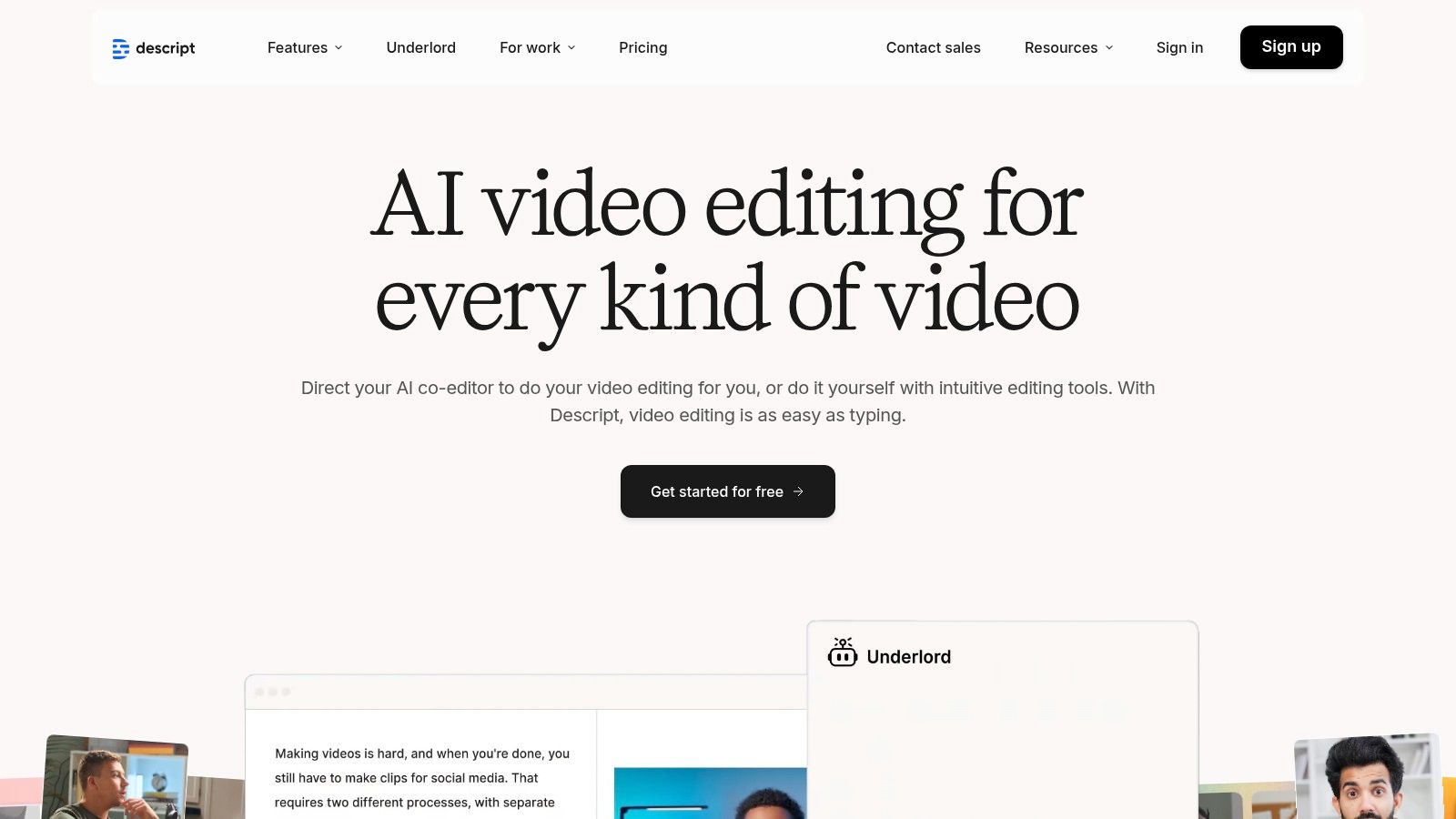
Key Features & User Experience
Descript's interface is celebrated for its polished design and intuitive, text-based editing paradigm. The entire process, from transcription and screen recording to multitrack production and voice cloning, feels cohesive and user-friendly. Overdub is specifically designed for cloning your own voice, ensuring a high degree of authenticity and control for personal projects.
- Pricing: A free plan exists with limited features. Paid plans start at $15/month per user, with the Pro plan ($30/month) offering unlimited Overdub usage.
- Best For: Podcasters, video creators, and educators who need to edit and correct their own voice recordings efficiently within a single production environment.
- Pros: Seamless integration of voice cloning into a mature editor, an excellent and polished user experience, and transparent, feature-rich pricing tiers.
- Cons: Overdub is primarily focused on cloning your own voice, not creating new ones or using a marketplace of voices. The platform is an editor first, not a standalone TTS or API solution.
Website: https://www.descript.com/
7. LOVO AI (Genny)
LOVO AI positions its platform, Genny, as a comprehensive content creation suite that goes beyond simple voice generation. It combines a robust text-to-speech engine and voice cloning capabilities with integrated video editing tools, making it a powerful solution for teams that manage entire production workflows. Its library of over 500 stock voices across 100 languages provides extensive variety, but its strength as one of the best AI voice clone tools lies in its accessibility and feature-rich environment.
What sets Genny apart is its all-in-one approach. Users can not only clone a voice but can also write scripts, generate subtitles, find background music, and edit video clips all within the same interface. The platform offers unlimited voice cloning attempts on its Pro and Pro+ plans, allowing for extensive experimentation without worrying about extra fees. This makes it an excellent choice for teams needing to produce diverse marketing or educational content at scale.
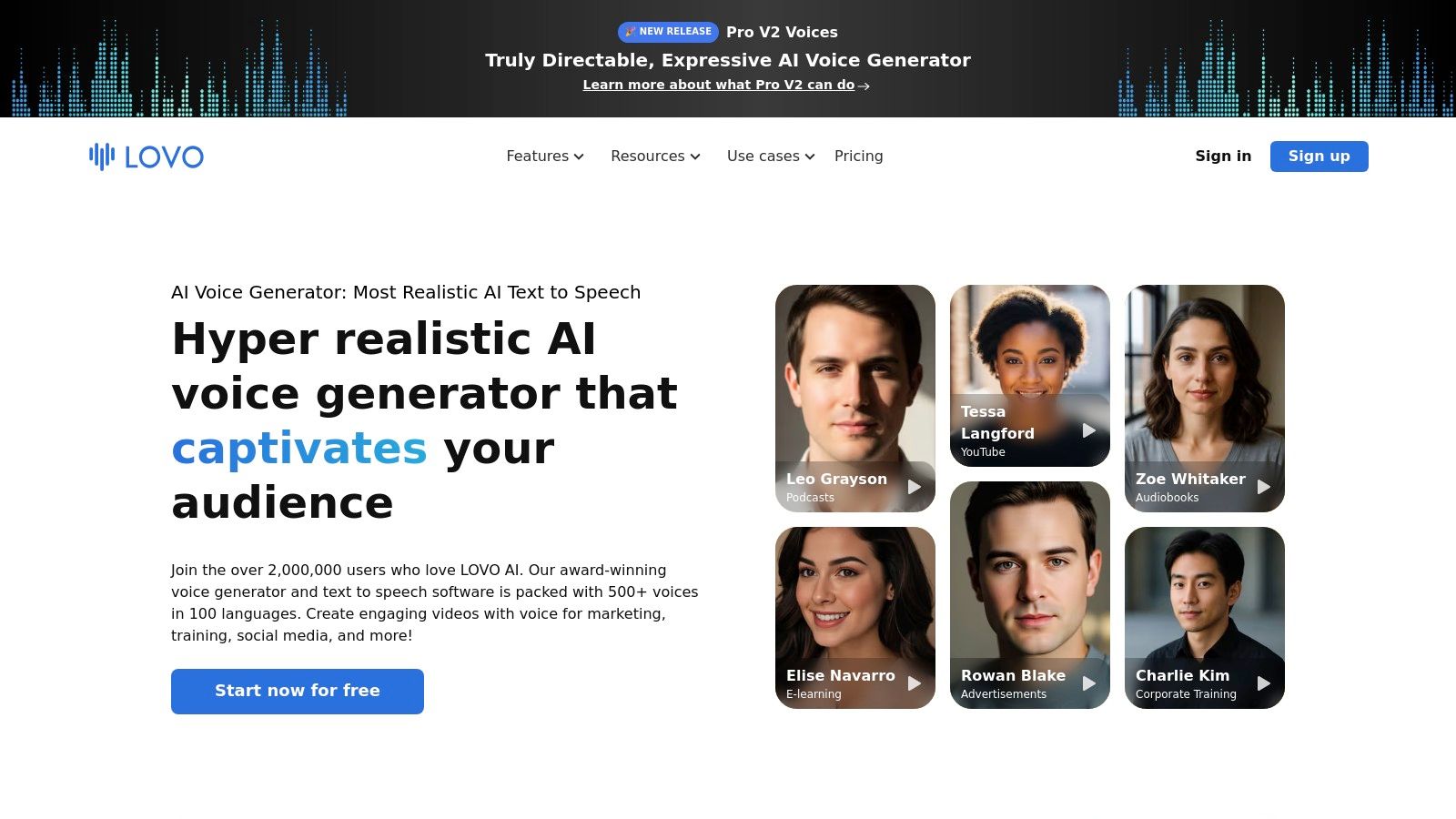
Key Features & User Experience
The Genny interface feels more like a creative studio than a simple TTS tool, with a timeline-based editor that is intuitive for anyone familiar with video production software. The platform’s Pro V2 voices offer advanced directional controls, allowing users to fine-tune pitch, emphasis, and pauses for more natural-sounding delivery. The inclusion of an API and commercial rights on all paid tiers adds significant value for professional use.
- Pricing: Offers a free plan with 20 minutes of generation. Paid plans start at $29/month for the Basic tier, with Pro plans beginning at $48/month, which includes unlimited cloning.
- Best For: Marketing teams, corporate trainers, and content creators who need an integrated solution for producing voice-over videos and presentations.
- Pros: The clear voice-hours pricing model is easy to understand, and the integrated video and script tools streamline content workflows. Commercial rights are included in paid plans.
- Cons: Monthly voice generation hour caps can be a limitation for very high-volume projects. The pricing for the top-tier Pro+ plan can increase significantly for enterprise-level usage.
Website: https://lovo.ai/
8. WellSaid Labs
WellSaid Labs positions itself as an enterprise-grade text-to-speech (TTS) solution, prioritizing reliability, compliance, and clear commercial licensing for corporate use cases. While it offers powerful voice generation, its approach differs from creator-focused tools, focusing on providing a library of pre-licensed "Voice Avatars" rather than open-ended cloning. This makes it an excellent choice for businesses needing a legally sound and scalable voice for corporate training, product tutorials, and public announcements.
The platform is built for professional production environments where consistency and quality are paramount. For organizations seeking a unique brand identity, WellSaid Labs offers a pathway to create a custom brand voice clone, which is typically handled as a direct enterprise engagement. This ensures the resulting voice meets stringent quality and legal standards, providing a secure and exclusive asset for the company.
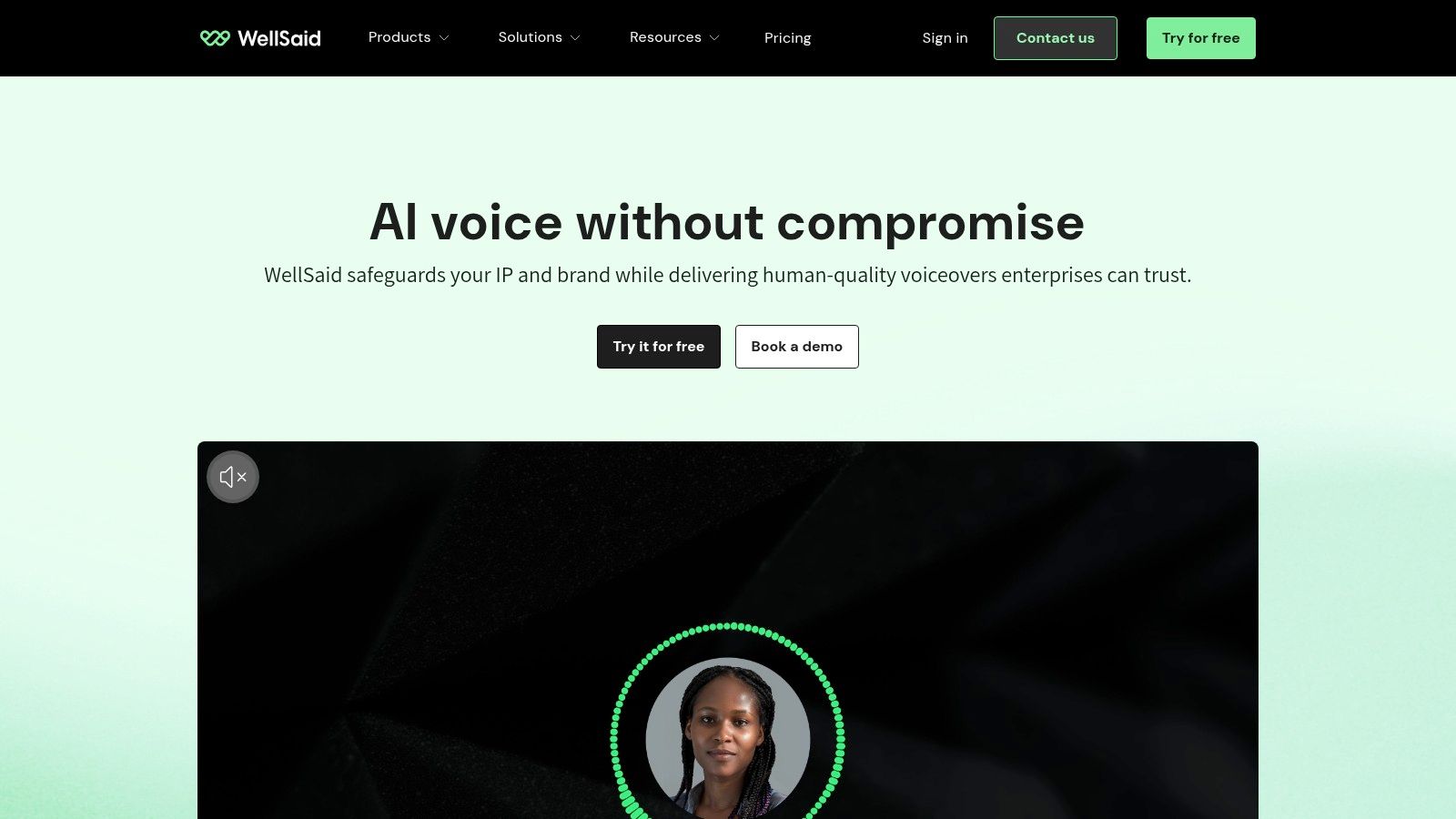
Key Features & User Experience
The platform is split between a "Studio" for content teams to collaborate on scripts and an API for developers to integrate voice generation into applications. The user interface is professional and clean, designed for efficient workflows. Users can easily select from various Voice Avatars, fine-tune pronunciation, and export audio in multiple formats (MP3, WAV, OGG).
- Pricing: Plans start with a free trial, with paid tiers beginning at $49/month. Pricing is based on download quotas and feature access, clearly geared toward business and team usage.
- Best For: Enterprises, corporate training departments, and marketing teams needing high-quality, commercially licensed synthetic voices for e-learning and production.
- Pros: Strong licensing and compliance posture, highly reliable performance for production environments, and clear, straightforward download and usage terms.
- Cons: Higher entry price compared to many competitors, and creating a custom voice is a more involved, service-based process rather than a self-serve feature.
Website: https://www.wellsaidlabs.com/
9. Microsoft Azure AI Speech (Custom Neural Voice / Personal Voice)
Microsoft Azure AI Speech offers an enterprise-grade pathway for creating a unique and scalable AI voice clone. Designed for large-scale production and regulated industries, it prioritizes security, compliance, and responsible AI practices. This platform is less of a quick-turnaround consumer tool and more of a robust, cloud-based solution for businesses that need to integrate a custom voice into their products and services with the reliability of the Azure ecosystem.
The platform offers two distinct capabilities: Custom Neural Voice (CNV) for building professional, studio-quality brand voices, and the newer Personal Voice feature for creating a replica of an individual's voice with just a small audio sample. A key differentiator is its strict approval gating and disclosure requirements, ensuring ethical deployment and preventing misuse. This makes it a standout choice for organizations where compliance is non-negotiable.
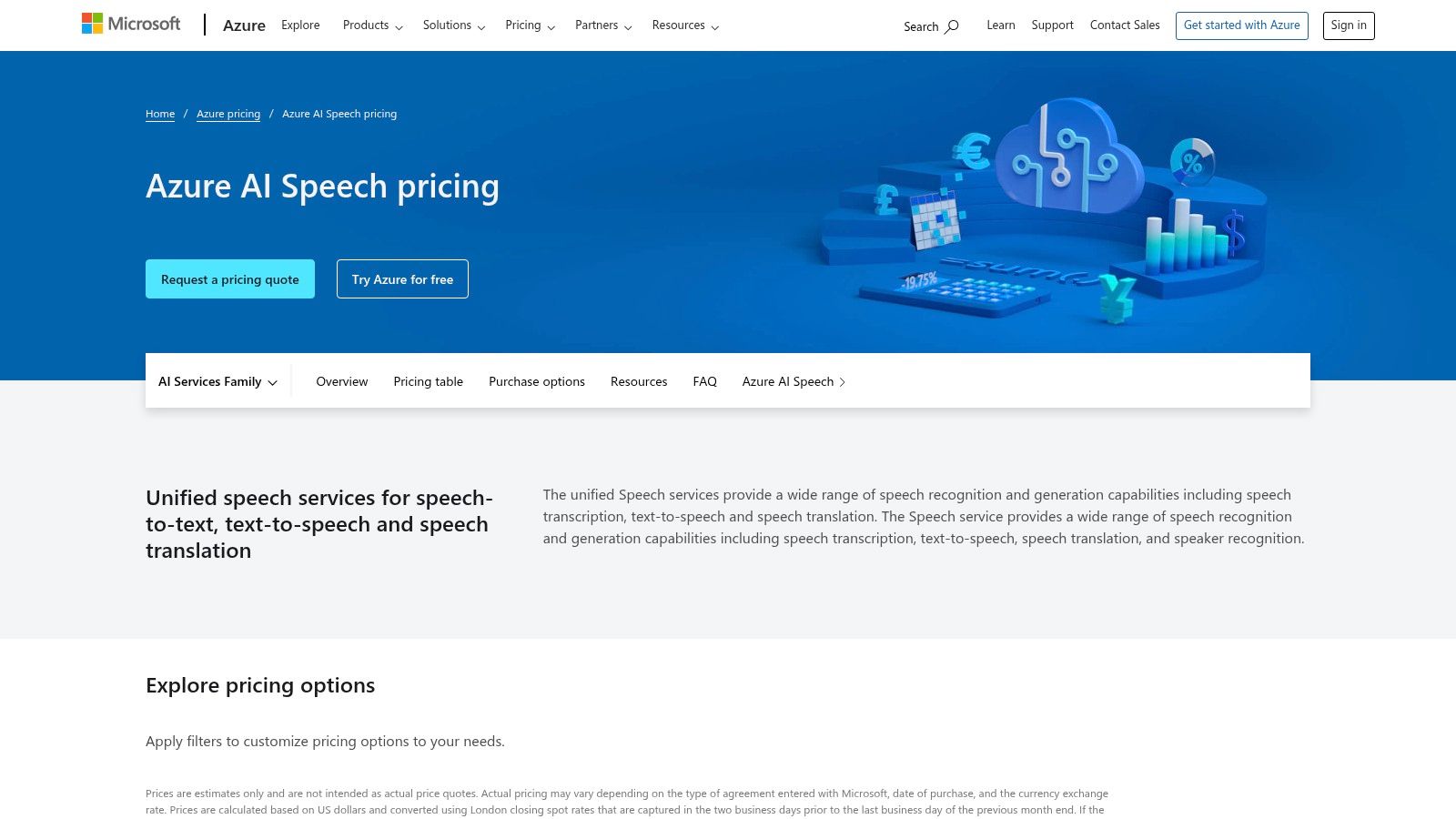
Key Features & User Experience
Integration is at the core of Azure AI Speech, with extensive API and SDK support across various platforms. The experience is geared towards developers and enterprise teams rather than casual users, with a focus on seamless deployment within the global Azure infrastructure. The Responsible AI controls are a central part of the user journey, requiring explicit consent and clear use case declaration.
- Pricing: Follows a pay-as-you-go model typical of cloud services. Pricing is based on transactions and hosting hours for custom voice models, which requires careful planning for cost management.
- Best For: Large enterprises, healthcare providers, financial institutions, and software companies needing a highly secure, scalable, and compliant custom voice solution.
- Pros: Unmatched scale, reliability, and integration within the Azure ecosystem. The compliance and review processes are ideal for regulated industries.
- Cons: Access is limited and requires an approval process, which can slow down onboarding. The strong gating and disclosure requirements are more stringent than on consumer-focused platforms.
Website: https://azure.microsoft.com/pricing/details/cognitive-services/speech-services/
10. Google Cloud Text-to-Speech
Google Cloud Text-to-Speech is an enterprise-grade solution from a tech giant, known for its sheer scale, reliability, and the quality of its Neural2 and WaveNet voices. While not primarily marketed as a simple cloning tool for individual creators, it offers powerful, scalable infrastructure for businesses needing to integrate high-quality synthetic speech into their applications. The platform boasts an extensive library of over 380 standard voices across more than 75 languages and variants.
Its strength lies in its robust API and comprehensive documentation, making it a go-to for developers building applications that require dependable, large-scale voice generation. While it historically offered a "Custom Voice" service for creating unique brand voices, reports indicated that new customer onboarding for this specific feature was limited. Users should verify the current availability of its 'instant custom voice' path, which represents its approach to a more accessible best ai voice clone solution.
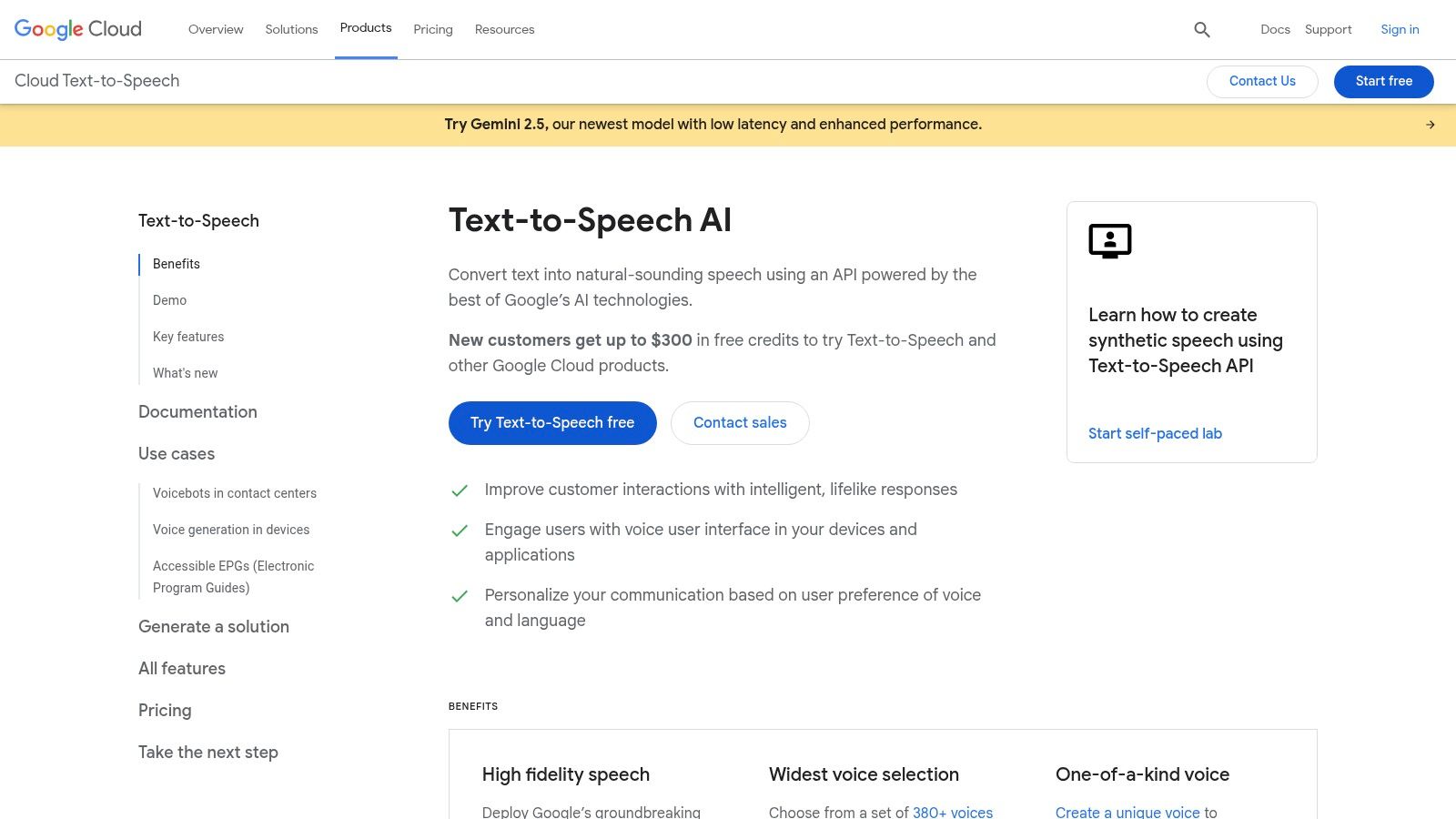
Key Features & User Experience
The platform is managed through the Google Cloud Console and is distinctly developer-focused. It provides granular control over speech output using SSML (Speech Synthesis Markup Language) for adjusting pitch, speed, and emphasis. Long-form audio synthesis is also a key capability, ideal for generating audiobooks or articles.
- Pricing: Follows a pay-as-you-go model based on the number of characters synthesized. It includes a generous free tier each month, making it cost-effective for testing and small-scale projects.
- Best For: Developers, large enterprises, and businesses needing a highly reliable, scalable, and API-driven text-to-speech engine for their products and services.
- Pros: Exceptional reliability and scalability, extensive language and voice library, and a very generous free tier for getting started.
- Cons: The platform is developer-centric and less user-friendly for non-technical users. The availability of its custom voice and cloning features for new customers has been historically less straightforward than dedicated cloning platforms.
Website: https://cloud.google.com/text-to-speech
11. Amazon Polly (AWS)
Amazon Polly is a mature, cloud-based text-to-speech (TTS) service from Amazon Web Services (AWS) that prioritizes reliability and scalability for enterprise applications. While not a direct self-serve voice cloning platform like others on this list, it provides a clear pathway for businesses to create a unique Brand Voice. This makes it a powerful option for companies deeply integrated into the AWS ecosystem looking for a production-grade, custom voice solution.
Polly's strength lies in its robust infrastructure and diverse voice families, including Standard, Neural, and Long-Form options designed for different use cases. The service is geared toward developers and businesses requiring a dependable voice solution for applications, customer service bots, or internal training modules, rather than individual creators needing quick clones. The process to create a custom Brand Voice is a collaborative engagement with the AWS team, ensuring a high-quality, secure result.
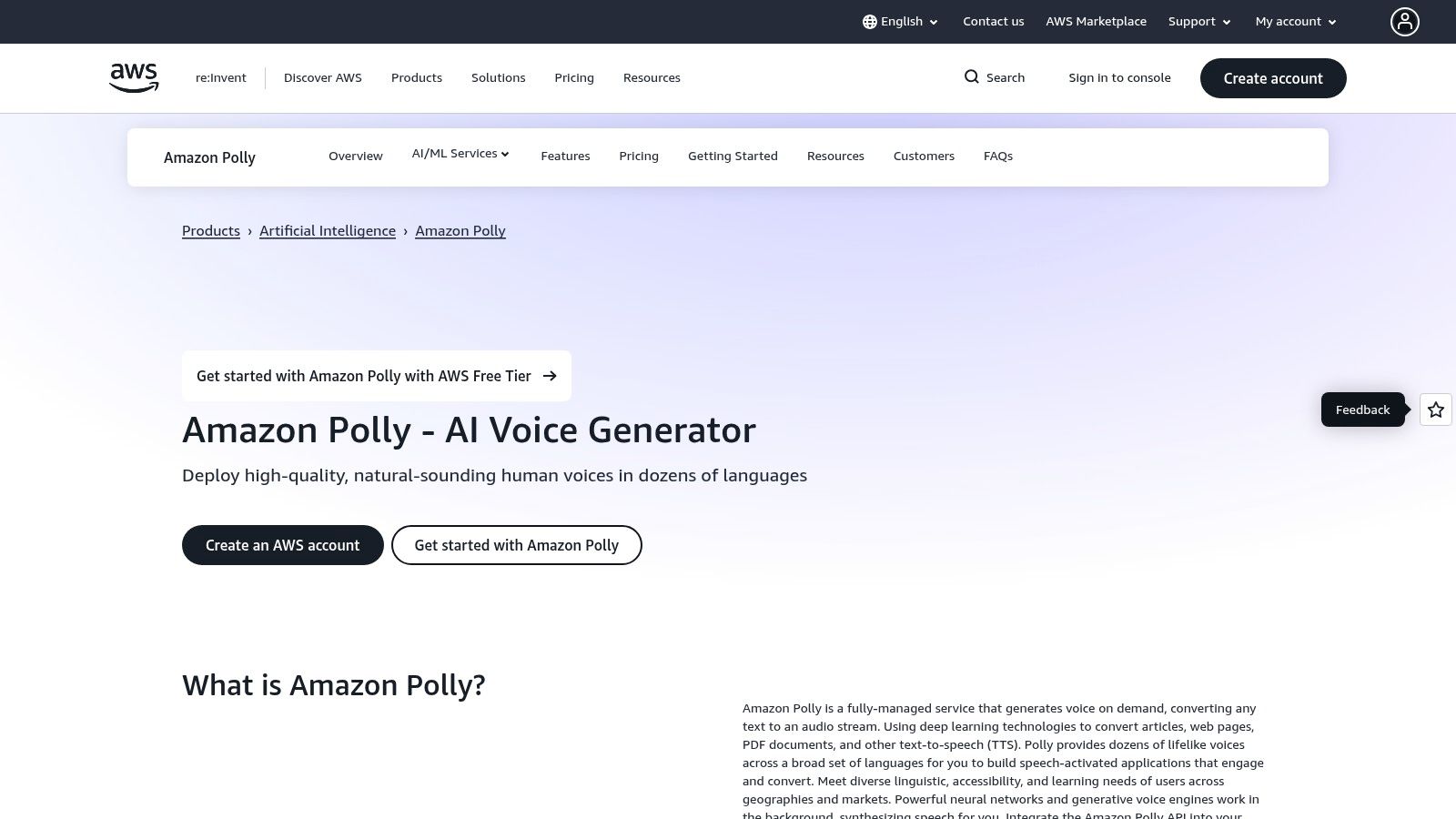
Key Features & User Experience
The service is managed through the AWS Management Console or, more commonly, via its well-documented SDKs and API. This makes it a seamless fit for development teams already leveraging AWS for their infrastructure. The platform offers features like Speech Marks to synchronize voice with animations or other on-screen events, providing granular control for interactive applications.
- Pricing: Follows a predictable, pay-as-you-go model based on the number of characters processed. A generous free tier is included in the standard AWS Free Tier.
- Best For: Enterprises and developers needing a highly reliable, scalable, and integratable TTS service with the option to create a custom brand voice through a managed process.
- Pros: Exceptional reliability and scalability backed by AWS, strong integration with other AWS services, and a clear, predictable pricing structure.
- Cons: Does not offer instant or self-serve voice cloning; creating a custom voice requires direct engagement with AWS. Creative controls are less intuitive than on creator-focused platforms.
Website: https://aws.amazon.com/polly/
12. MyShell OpenVoice (Open-source)
MyShell OpenVoice represents a unique and powerful option in the AI voice cloning landscape as a fully open-source, MIT-licensed project. This platform is designed for teams with technical expertise who want maximum control, privacy, and cost-efficiency. It provides instant, cross-lingual voice cloning from just a short audio sample, making it a compelling alternative to proprietary, cloud-based services for those who can manage their own machine learning infrastructure.
Its core strength lies in its "zero-shot" capability, allowing it to replicate a voice in multiple languages without needing specific training data for each. The model also offers granular control over tone, emotion, and style, such as rhythm and pauses. As an open-source tool, it grants developers complete freedom for commercial use and customization, eliminating vendor lock-in and per-minute usage fees.
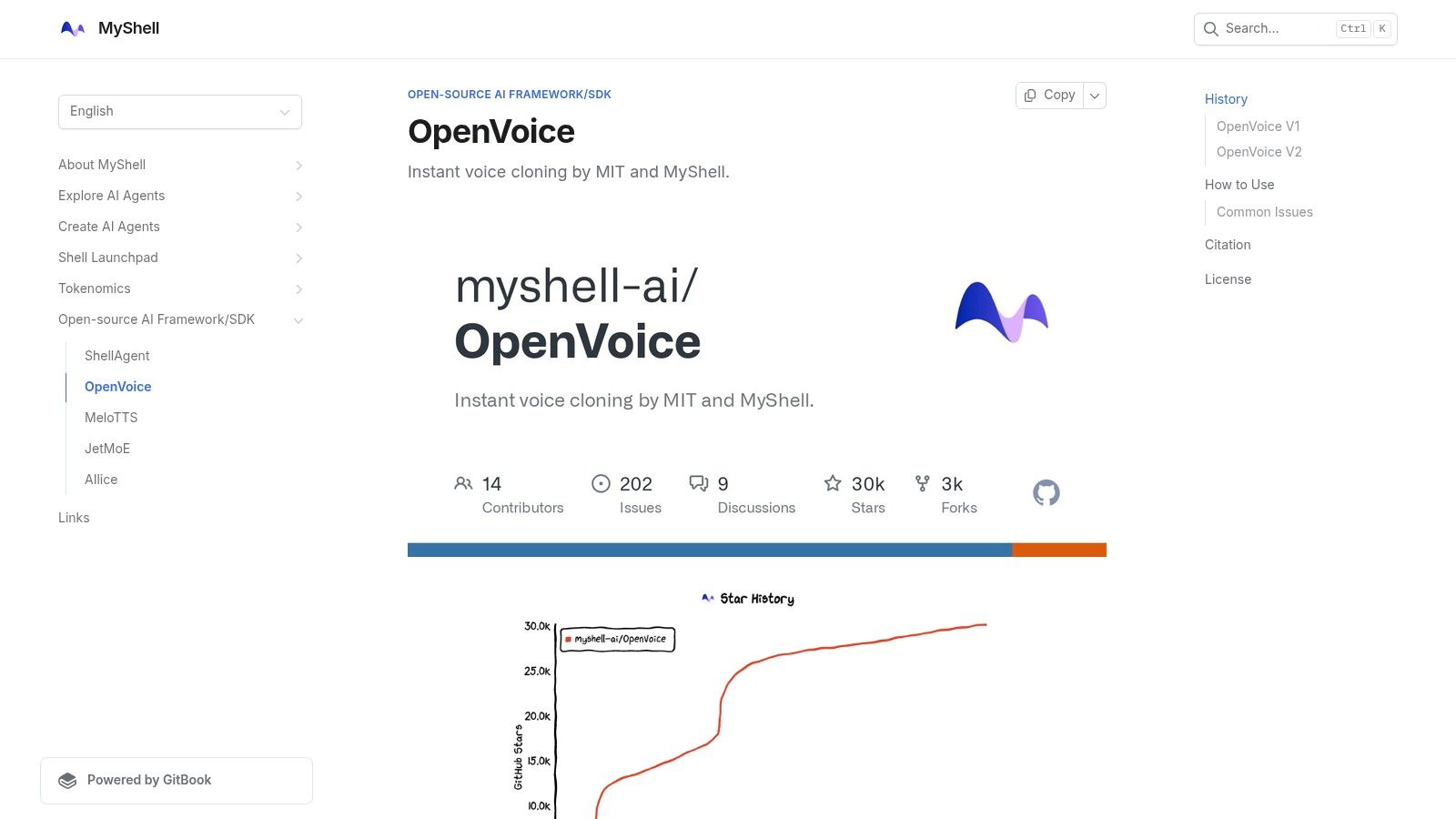
Key Features & User Experience
Since OpenVoice is a codebase rather than a polished web application, the user experience is defined by the team that implements it. It requires self-hosting and integration into your own workflows. This approach is ideal for businesses that prioritize data security and need a highly adaptable AI voice clone solution embedded directly into their products or internal systems.
- Pricing: Completely free to use under the MIT license. Costs are limited to the cloud or on-premise infrastructure required to run the models.
- Best For: Tech-savvy businesses, developers, and research teams that require a customizable, private, and scalable voice cloning solution without licensing fees.
- Pros: No licensing fees and free for commercial use, offers maximal control and portability, and supports flexible style and cross-lingual cloning.
- Cons: Requires significant machine learning and infrastructure skills to deploy and maintain. There is no official vendor support, relying instead on community and DIY maintenance.
Website: https://docs.myshell.ai/technology/openvoice
Top 12 AI Voice-Cloning Tools Comparison
| Provider | Core features | Quality & UX (★) | Unique selling points (✨/🏆) | Target audience (👥) | Pricing / Value (💰) |
|---|---|---|---|---|---|
| ElevenLabs | Instant & professional voice cloning, studio, API, automated dubbing, multi-lang | ★★★★☆ — high-fidelity, low latency | ✨ Instant PVC, large voice library, active roadmap 🏆 | 👥 Publishers, media teams, devs | 💰 Credit-based billing, free tier; mid-tier pricing |
| Resemble AI | Rapid & pro cloning, 140+ locales, voice marketplace, detection tooling | ★★★★☆ — nuanced emotion & SSML-like control | ✨ Licensable voice marketplace, deepfake protection 🏆 | 👥 Enterprise media, ad studios | 💰 Mid–high; advanced features on higher tiers |
| Voice.ai | Real-time voice changer, TTS & cloning, SDKs, low-latency streaming | ★★★★ — optimized for realtime interactivity | ✨ Real-time SDKs for streaming/gaming & live agents 🏆 | 👥 Streamers, gaming, interactive agents | 💰 Freemium; enterprise pricing opaque |
| Uberduck | Browser TTS & cloning, API, creator formats, commercial licensing | ★★★ — creator-friendly, quick prototyping | ✨ Playful formats (AI raps), mobile-friendly UI | 👥 Creators, indie publishers, prototypers | 💰 Very low entry price; paid tiers for commercial use |
| Kits.AI | Singing + speaking cloning, voice designer/blender, multitrack tools | ★★★★ — music-focused fidelity & tools | ✨ Choir/voice blender, creator-first music tools | 👥 Musicians, producers, creator studios | 💰 Free tier; paid with export-minute limits |
| Descript (Overdub) | Overdub voice cloning, text-based editing, multitrack A/V, captions | ★★★★☆ — polished UX, integrated editor workflow 🏆 | ✨ Overdub inside full editor (text-based workflow) | 👥 Podcasters, editors, editorial teams | 💰 Transparent tiers; Pro unlocks unlimited Overdub |
| LOVO AI (Genny) | Voice cloning, 500+ stock voices, script/subtitle tools, API | ★★★★ — large voice library, directable voices | ✨ Directable Pro V2 voices, video export support | 👥 Teams needing voice+video workflows | 💰 Clear voice-hours pricing; Pro/Pro+ for higher volumes |
| WellSaid Labs | Licensed voice avatars, API, custom brand voices, multiple formats | ★★★★☆ — enterprise-grade clarity & licensing | ✨ Strong licensing/compliance for corporate use 🏆 | 👥 Enterprise, e-learning, corporate training | 💰 Higher entry price; enterprise plans and services |
| Microsoft Azure AI Speech | Custom Neural/Personal Voice, SDKs, responsible-AI gating, global deploy | ★★★★☆ — scalable, compliant, production-ready | ✨ Strict responsible-AI controls & enterprise SLAs 🏆 | 👥 Regulated industries, large publishers | 💰 Enterprise pricing; approval gating required |
| Google Cloud TTS | WaveNet/neural voices, 380+ voices, SSML, long-audio synthesis | ★★★★ — highly reliable, broad language coverage | ✨ Extensive voice/lang catalog and clear API | 👥 Large-scale publishers, developers | 💰 Character-based pricing; generous free tier |
| Amazon Polly (AWS) | Standard/Neural/Generative/Long-Form voices, Speech Marks, SDKs | ★★★★ — predictable, production-proven | ✨ Deep AWS integration & long-form voice options 🏆 | 👥 Production systems, enterprise publishers | 💰 Per-character pricing; path to brand voices via AWS |
| MyShell OpenVoice (OSS) | Zero-shot cross-lingual cloning, style controls, self-hostable (MIT) | ★★★ — flexible quality (infra-dependent) | ✨ Open-source MIT, no licensing fees, full control 🏆 | 👥 Teams with ML/infra, privacy-focused publishers | 💰 Free (infrastructure costs only) |
Choosing Your Platform: The Future of Your Brand's Voice
The journey through the landscape of AI voice cloning technology reveals a clear and powerful truth: the right tool is not just a piece of software, but a strategic partner in defining and scaling your brand's auditory identity. We've explored a dozen powerful platforms, from the hyper-realistic emotionality of ElevenLabs to the enterprise-grade security of Microsoft Azure. The decision of which to adopt is less about finding a single "best" tool and more about identifying the platform that aligns perfectly with your specific operational needs, content strategy, and long-term vision.
Your choice is a pivotal one. The voice you generate will become an integral part of your user experience, shaping brand perception with every syllable. It’s the narrator of your audiobooks, the guide in your training modules, and the personality behind your marketing campaigns. Therefore, the selection process must be deliberate and thoughtful.
Key Takeaways and Decision Framework
As you weigh your options, reflect on the core insights from our analysis. The market for the best AI voice clone technology is segmented, with different solutions excelling in different areas. To make an informed choice, consider your primary objective.
For Unmatched Realism and Creative Control: Platforms like ElevenLabs and Resemble AI stand out. They offer granular control over emotional inflection, pacing, and vocal style, making them ideal for high-production value projects like audiobooks, character-driven voiceovers, and premium marketing content where nuance is non-negotiable.
For Integrated Content Creation Workflows: If your goal is to streamline a podcasting or video editing pipeline, an all-in-one solution is your best bet. Descript's Overdub is the clear leader here, embedding powerful voice cloning directly into a full-suite editor, saving creators invaluable time by eliminating the need to jump between applications.
For Enterprise-Level Security and Scalability: Large organizations, especially those in regulated industries, must prioritize compliance and robust infrastructure. Microsoft Azure AI Speech and Amazon Polly offer the security frameworks, scalability, and reliability required for deploying voice solutions at a massive scale, backed by the trust of global cloud leaders.
For Automated Content Transformation and Audience Growth: For media companies and publishers looking to repurpose existing text assets into engaging video and audio content, a specialized automation platform is crucial. This is where a solution like Aeon shines, providing a system built not just for voice creation but for the entire text-to-video workflow. It automates the process of creating brand-aligned video from articles, boosting traffic and engagement with minimal manual effort.
Your Actionable Next Steps
Making the final decision requires hands-on experience. Don't rely solely on demos or reviews. Your brand's voice is unique, and you need to hear how it translates through each platform.
- Define Your Core Use Case: Are you dubbing videos, creating a podcast, developing an IVR system, or automatically generating video from articles? Your primary application will immediately narrow the field.
- Test the Free Tiers: Almost every platform reviewed offers a free or trial tier. Upload the same high-quality audio sample to your top 2-3 choices. Listen critically for artifacts, unnatural cadence, and emotional flatness.
- Evaluate the Full Workflow: Consider the steps before and after voice generation. How easily does the tool integrate with your existing content management systems, video editors, or distribution channels? A slightly lower-quality voice from a highly integrated tool might save you more time and resources in the long run.
- Assess Long-Term Costs: Look beyond the introductory pricing. Model your expected usage over a year. Consider API call costs, per-character rates, and seat licenses to understand the true total cost of ownership as you scale.
The era of synthetic media is here, and your brand's voice is its vanguard. By choosing the platform that best fits your workflow, security needs, and strategic goals, you are not just adopting a new technology. You are building a scalable, consistent, and recognizable auditory signature that will resonate with your audience for years to come.
Ready to transform your written content into a powerful engine for audience growth? Aeon specializes in automating the creation of engaging, brand-aligned videos from your existing articles, complete with a customized AI voice clone. Stop letting your best content sit idle and start turning it into a consistent stream of video that drives traffic and engagement.

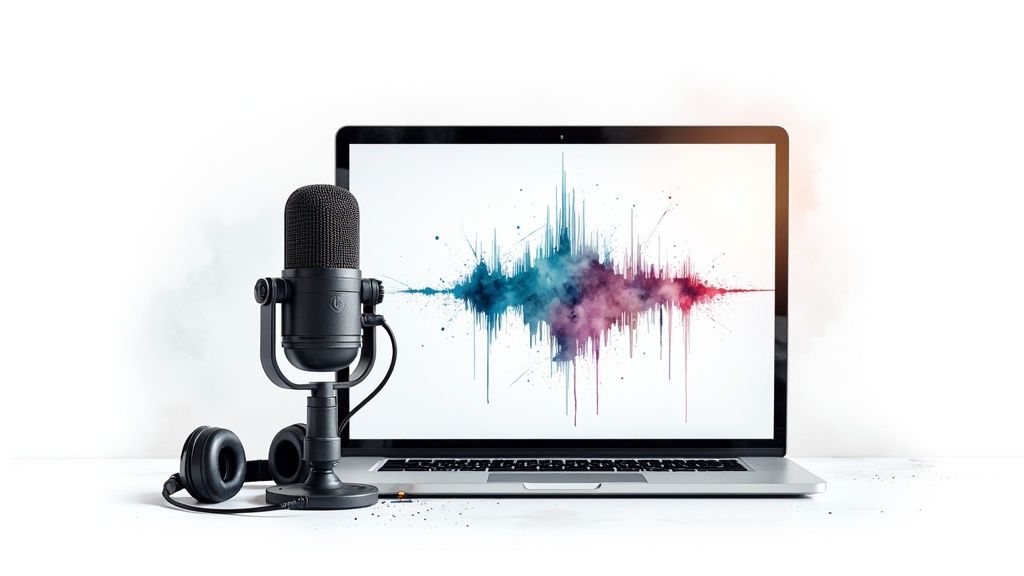
.jpg)